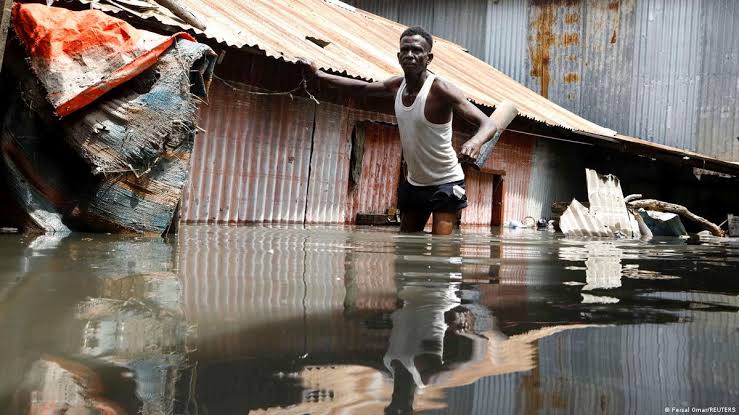Heatwaves, floods – those are just the tip of the iceberg. Climate change is pushing communities into a state of near-permanent crisis. From rising illness to disrupted food supplies, the very foundation of people’s health and way of life is under threat.
Record-breaking temperatures in South Asia, floods in Kenya, violent downpours in Oman, Dubai : 2024 has seen no shortage of extreme weather events.
GreentvAfrica reports on weather disasters that may appear like isolated, one-off incidents, but for those affected, they are trailed by insidious, lingering after-effects. Climate catastrophes intersect with long-term trends that are often already presenting huge challenges to the very fabric of society.
Many communities are increasingly facing a state of near-continuous crisis that affects multiple aspects of their health and well-being. Vulnerable and disadvantaged populations are typically the worst affected.
Over 21,000 health workers – primarily government civil servants from districts and facilities in west and central Africa, but with over 80 countries represented – have registered for Teach to Reach 10, a peer-learning event for health and humanitarian workers that is due to take place on 20–21 June 2024.
In advance of Teach to Reach 10, the Geneva Learning Foundation (TGLF) has been inviting registrants to describe how climate change is affecting the health of their local communities.
A notable theme of their responses has been the complex ramifications of climate change. Take extreme heat: heat waves increase the risk of heat stress and heat stroke.
But they may also trigger behavioural changes, such as sleeping outside, that increase exposure to disease-transmitting insects. Heat at night can disrupt sleep, leading to fatigue, mental health problems and increased risk of interpersonal conflict.
Droughts affect agricultural productivity, reducing farmers’ income, increasing poverty, affecting the availability of fresh produce, increasing prices and exacerbating cost-of-living challenges. These impacts can have profound and unexpected consequences.
| “Last year, Malawi experienced one of the most dreadful natural disasters, ‘Cyclone Freddy’. This cyclone destroyed people’s settlements, businesses and even claimed the lives of many people. Not spared during the cyclone were key populations, which include female sex workers. In Malawi, female sex workers solely rely on sex work as a means of generating money. Due to the financial impact brought by Cyclone Freddy, many female sex workers found themselves scrambling for customers in order to earn a little money for their upkeep. This made other female sex workers resort to giving in to unprotected sex to make more money. This had led to a surge in sexually transmitted infections among female sex workers.”
– Phillip King, NGO HIV/AIDS field officer, Zomba District, Malawi. |
Other climate impacts, such as increased risk of flooding, have a similar mix of acute and long-term consequences.
| “I… was told that two frail old people had been floating on tree branches waiting to die. I hired a canoe to pick them up and brought them ashore at Lake Victoria.”
Muhozi Norbert, Field Epidemiologist, Namirembe Masaka District, Uganda “An expectant woman who climbed a tree because of the flooding was forced to deliver on a tree and was attended by a midwife.” – Taban Anthony Stephen, Public health specialist, South Sudan |
But Taban Anthony Stephen also highlighted how floods washed away health facilities and “roads became rivers”, dramatically affecting access to care. Other contributors highlighted how health systems face both increased demand and a reduced ability to provide services. An experience shared from Cameroon illustrates the complexity of the lived reality:
| “Allow me to share a real-world experience that illustrates the devastating impact of climate change on health in the communities where I practise. In 2021, the Western region of Cameroon experienced unprecedented torrential rains, leading to massive flooding. Entire villages found themselves under water for weeks.As a field epidemiologist, I was deployed with my team to assess damage and provide emergency medical assistance. What struck me the most was the scale of the health disaster that occurred in the wake of these floods. Drinking water sources were contaminated by floodwaters, causing a devastating outbreak of cholera. In just a few weeks, we have recorded hundreds of cases and dozens of deaths, mainly among children and the elderly.
At the same time, poor hygienic conditions in the makeshift camps have favoured the spread of diarrhoeal diseases, scabies and other skin infections. Health centres were quickly overwhelmed, lacking resources to cope with the massive influx of patients. Additionally, flooding has destroyed food crops, leading to acute food insecurity in the region. We have seen an alarming increase in cases of severe malnutrition among children, putting them at increased risk of disease and death. This experience had a profound impact on me and opened my eyes to the devastating consequences that climate change can have on public health, particularly in vulnerable and underprepared communities. It highlights the urgency of action to mitigate the effects of climate change and strengthen the resilience of health systems in the face of these emerging crises. This is why I believe my first-hand account, coupled with robust epidemiological data, could offer valuable insight into the real impact of climate change on health in our region. This could help raise awareness among partners and mobilize resources for targeted and sustainable interventions.” – Ndjie Daniel Laetitia, Epidemiologist, NGO, Dschang District, Cameroon |
It is inevitable that populations around the world will face more climate-related challenges. It is not inevitable that these challenges will have the devastating effects described above. More robust and resilient public health programmes and primary health care systems could significantly reduce impacts on human health and wellbeing.
The health worker contributions emphasise that systems-based approaches, which consider the full range of potential impacts, are needed, with full community participation to ensure mitigation measures are appropriate, workable and sustainable.
And, as the contributions from health workers at the frontline of climate change also starkly illustrate, such efforts are needed now.

